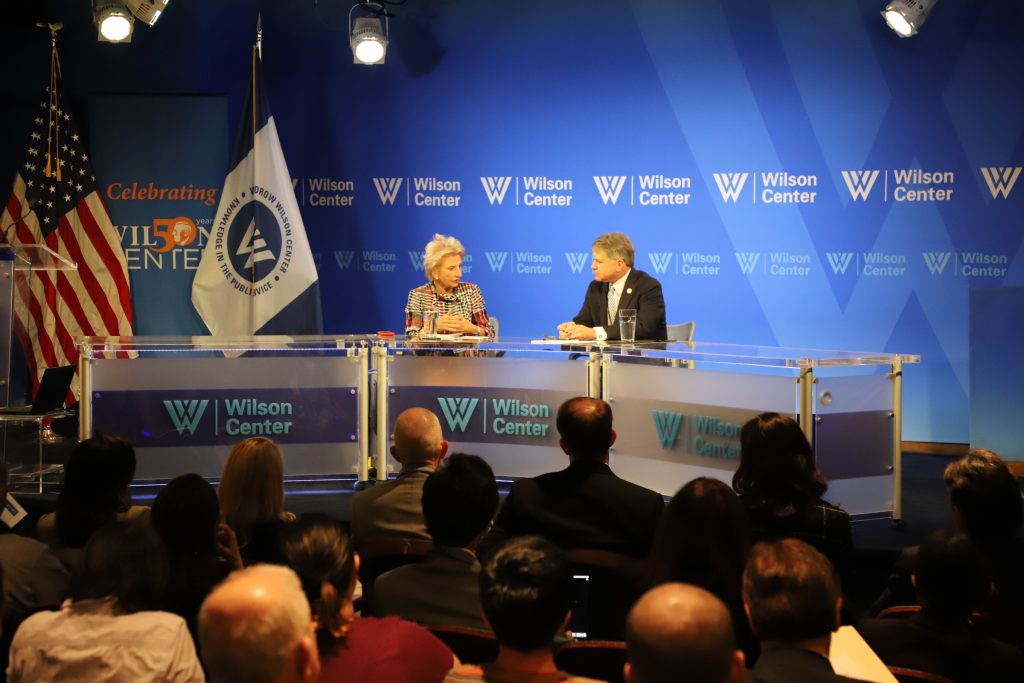ICYMI: McCaul Talks U.S. Policy in Global Hotspots at the Wilson Center
Washington D.C. – Earlier this week, Lead Republican Michael McCaul sat down with Wilson Center President, Jane Harman, for a wide-ranging conversation on U.S. policy in global hotspots. The conversation touched on foreign policy challenges that include Venezuela, the implications of China’s Belt and Road Initiative, the relationship between the United States and Russia, ongoing conflicts in the Middle East, future of negotiations with North Korea, and more. To access a video of the full conversation, please click on the link or photo below.
On Venezuela…
“It’s the biggest humanitarian and refugee crisis in the Western Hemisphere. And I saw it firsthand, watching 50,000 refugees per day come out of Venezuela… As a human being, it was one of the most awful things I think I have seen in my lifetime… I blame it on Maduro… This dictator has destroyed his country; which twenty years ago was one of the most prosperous nations in Latin America and now it’s becoming one of the biggest crises.
“The Cuban security forces are there threatening the military everyday and their families to stay with Maduro because they have a vested interest with the oil that’s given to Cuba. But what is most frightening… is the fact that the Russians are in there… When you have Russian military assets now being put into Venezuela to back up Maduro, one can only imagine a doomsday scenario where they would say, ‘let us build a military port in Caracas and we’ll keep you in power.’ Let’s hope that doesn’t happen.
“One thing is clear to me, as long as Maduro is there, we’re going to continue to have this problem. I think the real question is how do you get rid of him and I think that is a very difficult foreign policy challenge.”
On reports of cuts to foreign aid in Central America…
“What USAID is doing down there, rerouting at-risk youth into training, into computer science, away from MS-13. We got briefed by the international law enforcement that’s taking place in El Salvador where MS-13 is prevalent. That has been hugely successful — they briefed us on all of the arrests that they made and the crack down on MS-13. In the last two years the numbers, with respect to this aid, have actually lowered the crime rate, helped the economy.
“We’ve got to stabilize these areas and if we don’t it’s going to get worse and it’s not going to help the immigration situation; it’s just going to get worse. We can be very reactive at our border to stop them from coming in, but if we don’t address the root cause of the problem through the Central American security initiative, we’re going to continue to have this problem.
“We are planning to have a hearing on this … I think it’s a great return on our investment because if you can stabilize those nations, then you can take the root cause of the problem away… But if we cut all this funding and a lot of it, quite honestly, is serious law enforcement that we are doing down there; FBI, DEA under the INL auspices, I think it’s going to make things tragically worse, not better.”
On China…
“The last threat briefing I had when I was Chairman of Homeland, I had the FBI foreign counterintelligence and they told me and I think this says it all… we’re shifting from radical Islamist terrorism, which is still a threat, but we’re shifting that to China. Which indicates to me that China is the number one threat.
China through the ‘One Belt One Road’… they overleverage the countries, they bring their own workers in, exploit the resources, and effectively economically take over the country. They’re going to bring their 5G in, that’s the telecommunications. If China brings this 5G in, they own those countries.”
“They are rivals. We must treat them as such. They are all over the world, and their ultimate goal is to occupy the economy and dominate the world.”
On denuclearization in North Korea…
“It’s a huge challenge. We’ve had three prior administrations trying to negotiate this and every time we have made concessions… and now we are at the point today where they do have intercontinental ballistic missile capability…
“To not engage would be highly irresponsible. I commend the Administration for engaging and having conversations. Are they going to be able to talk in a week for ‘full denuclearization?’ There’s also a question of what that definition means. It’s different to Kim Jong Un as to what it is from our point of view…
“I think when they [President Trump and Kim Jong-Un] had the meeting in Hanoi, and the North Koreans only divulged probably half of their nuclear sites, that was not in good faith. And I think the decision to walk away was a good one… And I think just to get a deal, if it’s a bad deal, you have to know when to walk away.”
###
